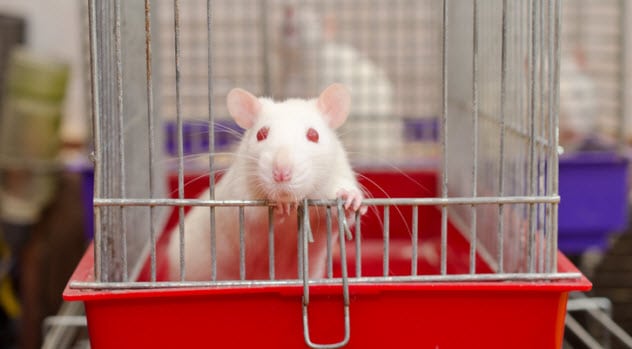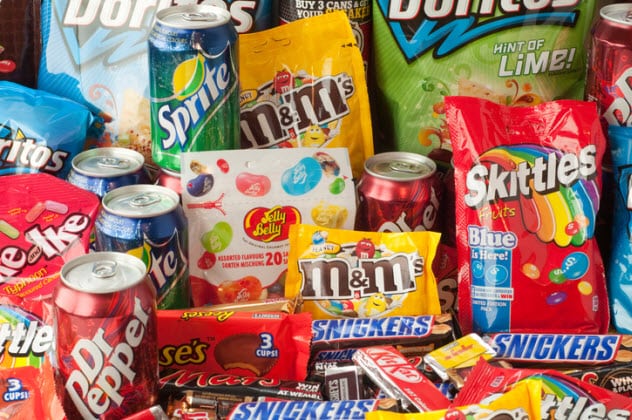 History
History  History
History  Weird Stuff
Weird Stuff 10 Wacky Conspiracy Theories You Will Need to Sit Down For
 Movies and TV
Movies and TV 10 Weird Ways That TV Shows Were Censored
 Our World
Our World 10 Places with Geological Features That Shouldn’t Exist
 Crime
Crime 10 Dark Details of the “Bodies in the Barrels” Murders
 Animals
Animals The Animal Kingdom’s 10 Greatest Dance Moves
 Movies and TV
Movies and TV 10 Box Office Bombs That We Should Have Predicted in 2025
 History
History 10 Extreme Laws That Tried to Engineer Society
 History
History 10 “Modern” Problems with Surprising Historical Analogs
 Health
Health 10 Everyday Activities That Secretly Alter Consciousness
 History
History 10 Dirty Government Secrets Revealed by Declassified Files
 Weird Stuff
Weird Stuff 10 Wacky Conspiracy Theories You Will Need to Sit Down For
 Movies and TV
Movies and TV 10 Weird Ways That TV Shows Were Censored
Who's Behind Listverse?

Jamie Frater
Head Editor
Jamie founded Listverse due to an insatiable desire to share fascinating, obscure, and bizarre facts. He has been a guest speaker on numerous national radio and television stations and is a five time published author.
More About Us Our World
Our World 10 Places with Geological Features That Shouldn’t Exist
 Crime
Crime 10 Dark Details of the “Bodies in the Barrels” Murders
 Animals
Animals The Animal Kingdom’s 10 Greatest Dance Moves
 Movies and TV
Movies and TV 10 Box Office Bombs That We Should Have Predicted in 2025
 History
History 10 Extreme Laws That Tried to Engineer Society
 History
History 10 “Modern” Problems with Surprising Historical Analogs
 Health
Health 10 Everyday Activities That Secretly Alter Consciousness
Top 10 Studies That Contradict Common Things We Believe
Researchers regularly conduct studies to find answers to our problems or just to make our lives better. However, there are several things we believe that have been contradicted and claimed to be false by these same studies.
Some research has sparked controversy and criticism. Sometimes, large corporations are also found to be funding these studies for their own personal gain.
10 Drugs Are Not Addictive

In 1979, Bruce Alexander of Simon Fraser University conducted a study to prove that drugs are not addictive and that the environment causes addiction instead. The study, known today as Rat Park, involved an experiment where Alexander kept some rats in one of two cages. The rats were allowed to socialize in one cage and were isolated in the other. Both were fed morphine mixed with water.
Alexander noted that the rats in the isolated cage consumed seven times more morphine than the rats that were allowed to socialize. He concluded that loneliness and the environment were the major causes of drug addiction. The study was so controversial that its sponsors ceased further funding and two popular journals refused to publish it. It was also heavily criticized because it contradicts the general belief that drugs are addictive.
One scientist noted that the device used to measure the amount of morphine consumed by the rats in one of the cages was defective, leading to incorrect results. Male and female rats were also allowed to mate and have pups in one cage, while they were not allowed to interact in the isolated cage.
Other studies that repeated the Rat Park experiment have ended with different results. Sometimes, the rats in the isolated cages drank more morphine. At other times, the rats allowed to socialize drank more.[1]
9 Diet Soda Is Healthier Than Water

As published in the International Journal of Obesity, research by the University of Bristol concluded that diet soda is healthier than water. The study revealed that the low-energy sweeteners in diet soda result in less body weight and energy intake as compared to water. In essence, the researchers claimed that diet soda is healthy and does not cause obesity.
The study was heavily criticized for two reasons. First, it was indirectly sponsored by the soda industry—that is, the likes of Pepsi and Coca-Cola. The research was sponsored by the International Life Sciences Institute (ILSI), whose board of directors includes doctors from several corporations such as Pepsi and Coca-Cola.
Dr. Peter Rogers, who oversaw the study, is a cochairman on the ILSI’s Eating Behavior and Energy Balance Task Force. The chairman, vice chairman, and other members of this task force include doctors from several other corporations. Several authors who also worked on the study and journal article received €750 each.[2]
Second, the authors had reviewed 5,500 papers for their research but based their comparison of soda consumption and weight loss on only three. Two papers found no correlation between the consumption of diet soda and weight loss. Meanwhile, the third claimed that diet soda caused weight loss, but it was sponsored by the American Beverage Association. (The American Beverage Association includes corporations like Pepsi and Coca-Cola.)
8 Laughter Can Be Dangerous

Laughter is often said to be the best medicine. However, according to the results of research by the University of Birmingham’s Professor R.E. Ferner and then-fellow J.K. Aronson, laughing could be dangerous and even deadly. They analyzed earlier studies on laughter.
The researchers filtered through almost 5,000 studies, of which 785 were directly relevant to their research. Of the 785, 85 considered laughter to be healthy while 114 found that it was dangerous. The studies revealed that laughter could cause abdominal hernia, jaw dislocation, stress incontinence, headache, asthma, and fainting.
Laughter was also fingered as a cause of Boerhaave’s syndrome, a type of medical ailment where there is a hole in the esophagus. Most of the time, it is caused by vomiting. Laughter could also allow the entry of infectious diseases into the body because the person laughing opens his mouth wide and breathes sharply. Excessive laughter could also be the sign of an underlying psychological problem.[3]
However, laughter does have health benefits. It has been linked with improving metabolism, the lungs, and fertility in women. Ferner concluded that we cannot determine the amount of laughter that is good for us, but we should not laugh in excess.
7 Alcohol Is Better Than Exercise

University of California researchers concluded that senior citizens over 90 years old lived longer if they frequently consumed beer and wine. During their study called 90+, the researchers visited over 1,600 senior citizens older than 90 at six-month intervals to run certain tests and get information about their eating habits, medications, and more.
They discovered that senior citizens who consumed one glass of wine or two glasses of beer a day are 18 percent less likely to die than other senior citizens. On the other hand, senior citizens who exercised 15–45 minutes a day are 11 percent less likely to die than other senior citizens. The senior citizens with the best odds of survival regularly exercised, drank wine and coffee, and were a bit overweight. They were 21 percent less likely to die than other senior citizens.
The researchers also noted that seniors over 70 who were a bit overweight lived longer than those who were underweight or of normal size. Claudia Kawas, who led the study, stated that she couldn’t explain the reason for the results. However, she believes that the study was correct and moderate drinking promoted longer life in senior citizens.[4]
6 Exercise Is Bad For You

According to Alimentary Pharmacology and Therapeutics, an Australian sports journal, too much exercise is bad for your health. The journal revealed that exercise lasting more than two hours a day could cause several disorders and diseases in the body.
One of the disorders is leaky gut syndrome. In this instance, the lining of the gut becomes weak, allowing germs and toxins to leak into the blood and cause diseases like multiple sclerosis and chronic fatigue. Excessive exercise has also been linked to the weakening of the heart muscle, leading to abnormal heart rhythms and, consequently, heart attacks.
Excessive exercise also leads to the secretion of a hormone called cortisol, which is normally released when a person is very stressed or afraid. The body quickly returns to normal when it is secreted under these conditions. But cortisol secretion caused by heavy exercise leaves the body at a heightened level, weakening the immune system and the bones.[5]
This reduces bone density and increases the risk of bone fracture as well as other bone conditions like osteoporosis and arthritis. Excessive exercise also leads to “overtraining syndrome,” which has the same effects on the body as someone suffering from clinical depression. Overtraining syndrome leaves sufferers irritated, less motivated, and unable to sleep.
5 It Is Good To Tell Lies

Sometimes, lying is good—at least as revealed by a study from the Wharton School of the University of Pennsylvania. Coauthored by doctoral student Emma Levine and Professor Maurice Schweitzer, the study found that it is good to lie to others to stop them from feeling bad. For instance, it is good to tell a friend that his latest artwork is superb even though it is not.
Both researchers recreated events where someone lied to someone else. Hundreds of participants were then asked to determine whether they considered the lie to be good or bad. All participants agreed that the lies told to stop a person from feeling bad were good, while lies that harmed a person or had no effect on their feelings were bad.[6]
4 Taking Notes Makes Us Forgetful

A study by Michelle Eskritt and Sierra Ma of Mount St. Vincent University found that taking notes makes us forgetful. This happens because the brain refuses to store certain information when it knows we have stored it somewhere else.
The researchers made two groups of participants play a memory game called Concentration. Only one group was allowed to take notes. However, they had their notes taken away before the game was over.
At the end, the group that took notes recalled less of what they had seen when compared to the group that did not take notes. The study concluded that learning and remembering are two different things. The brain can refuse to store and remember information for the simple reason that you have it stored elsewhere.[7]
3 Soda And Junk Food Do Not Cause Obesity

Junk food and soda have been fingered as one of the primary causes of obesity. However, research by professors David Just and Brian Wansink of Cornell University found otherwise. For the study, the researchers looked into the amount of soda and junk food consumed by 5,000 Americans on any two days of the week during 2007 and 2008.
They concluded that 95 percent of normal weight people did not become fatter by eating junk food or drinking soda. They also found that normal weight and obese people ate almost the same amounts of junk food. As a result, the researchers argued that obesity is caused by the number of calories a person consumes and not by the type of food eaten. The researchers were concerned that certain foods and drinks were being wrongly “vilified” while the real causes of obesity were being ignored.
The study has not been without critics. Stacey Lockyer of the British Nutrition Foundation stated that the researchers did not actually consider the exact types and quantities of junk food and soda ingested by their study group. This is important because obesity depends on the difference between caloric intake and calories used. Besides, obese people have been known to deliberately lie about the actual number of calories they consume.[8]
2 Showering Is Bad

Research by the Genetic Science Center of the University of Utah found that showering could be bad for us. Although it is good to shower frequently, too much showering can kill certain important bacteria and viruses that live on or in our bodies, which leaves us less resistant to diseases. It also increases our risk of heart problems and causes the digestive system to work improperly.
A study on the indigenous people of Yanomami village in the Amazon revealed that they have the most diverse bacteria on their skin as compared to any other human population. They even had bacteria that were resistant to antibiotics, although they had never used antibiotics.
While the researchers believe that excessive showering by Westerners affects the diversity of the human microbiome, they never told us exactly how much we should shower.[9]
1 Talking To Yourself Is Actually Good

Talking to oneself is usually fingered as the first step before someone goes crazy, but researchers at Bangor University say otherwise. Especially when it’s loud, talking to yourself might be an indicator of higher intelligence. Dr. Paloma Mari-Beffa, a psychologist and coauthor of the study, stated that this behavior helps us to think, plan, and focus better. It could also improve our motivation, especially when we are stressed.
To confirm their hypothesis, the researchers gave written instructions to 28 participants, which these people were told to either read out loud or silently. Then the participants were given some tasks. The results showed that people who read their instructions out loud performed better than those who did not. While the study was conducted on a small population, an earlier study supports this stance.
In the earlier study, psychologists Gary Lupyan of the University of Wisconsin–Madison and Daniel Swingley of the University of Pennsylvania revealed that people find things faster and execute tasks better when they talk to themselves out loud about it. For instance, a child laces his shoes better if he talks himself through the process.
People also find things faster when they mention the name of whatever they are looking for. Interestingly, the name of the product also had an effect on how fast the participants found the items. Those looking for Coke found it faster while they repeated “Coke” than those looking for Speed Stick deodorant who repeated “Speed Stick.”[10]
Read more fascinating findings about studies on 10 Reasons Scientific Studies Can Be Surprisingly Inaccurate and 10 Ridiculous But Surprisingly Fascinating Scientific Research Studies.








